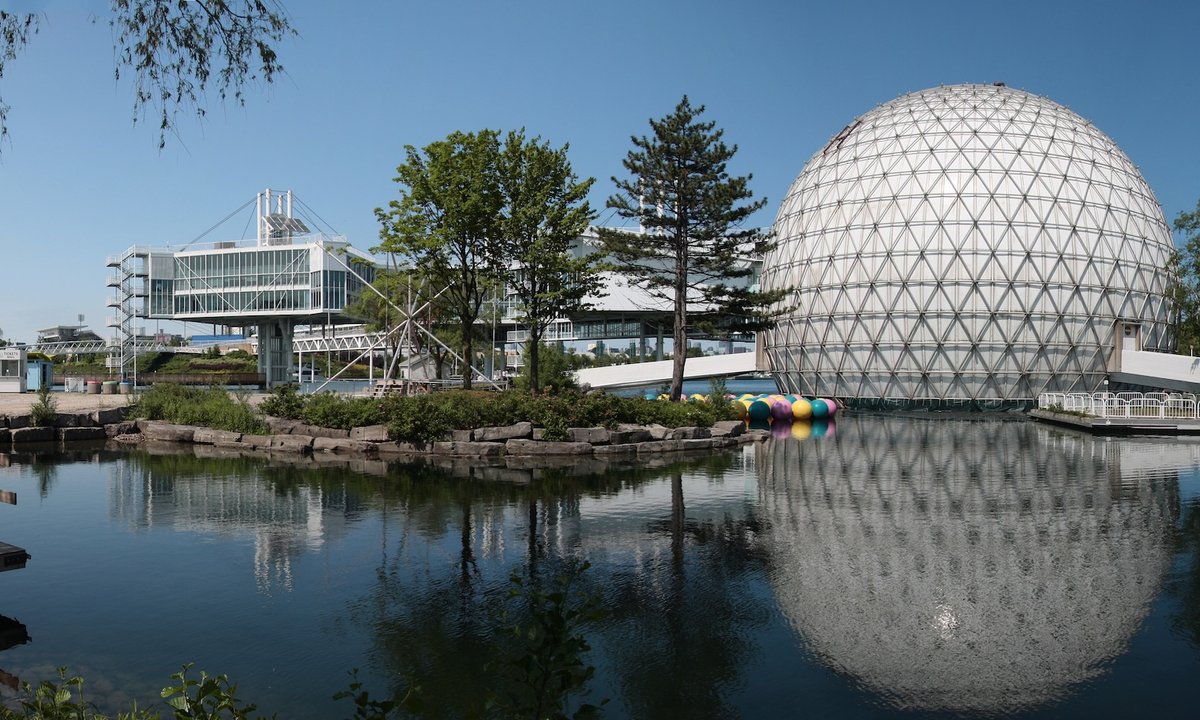Toronto-area landscape architects, historians and residents hoping to preserve the Canadian heritage site Ontario Place were dealt a serious blow last week, when an Ontario court rejected a closely watched legal challenge to the provincial government’s plans to build a mega-spa on one of the Modernist complex’s artificial islands. (A previous effort by the province to block the case was dismissed in April.)
Critics of the redevelopment plan say it will not only destroy the landscape architect Michael Hough’s original design but also wildlife habitats and local vegetation (including chopping down more than 800 trees), all while privatising a well-loved public space.
On 11 June, Ontario’s Superior Court of Justice dismissed a request by the non-profit organisation Ontario Place for All for an environmental assessment of Ontario Place’s West Island, the future site of the spa. The suit had been filed in response to an attempt to scuttle a required assessment of the heritage site prior to redevelopment by the government of Ontario premier Rob Ford, leader of the centre-right Progressive Conservative Party of Ontario. Last December, one week after the request for judicial review was filed, the province passed the Rebuilding Ontario Place Act, which nixed Ontario Place’s protections as a heritage site and exempted it from environmental assessment.
“The applicant’s request for an order requiring the respondents to conduct an environmental assessment of the West Island redevelopment cannot succeed,” a three-judge panel concluded, citing the authority of the new law.
Norm Di Pasquale, co-chair of Ontario Place for All—which now boasts more than 30,000 supporters—told Calvi Leon of the Toronto Star that the court’s recent decision “sets a very terrible precedent for the future of our Ontario public institutions. If they’ve done this here, what is going to stop them from doing this elsewhere?”
Chris Glover, a Member of Provincial Parliament (MPP) affiliated with the centre-left New Democratic Party (NDP), went one step further, saying it was “appalling” that Ford’s government had wielded its power to “retroactively change the law and push through this corrupt deal”.
The political power struggle over the future of Ontario Place dates back to 2018, when Ford—at the time newly elected as Ontario’s premier—started officially collecting proposals to redevelop Ontario Place without public input or regard for its heritage status. Ontario Place was subsequently added to the World Monuments Fund’s 2020 watch list of places “in need of urgent action”.
In 2022, a deal came to light between the Ford government and the Austrian wellness company Therme to build a mega-spa on the site’s West Island—with taxpayers footing a bill of C$650m ($481m) for site servicing and an adjacent parking garage. Later, it was revealed that there existed a 95-year lease agreement between the province and Therme, and that Ford’s government had spent C$2m ($1.5m) in taxpayer money to “raise awareness” of the redevelopment plan, angering local residents.
With Toronto’s mayoral elections in sight, Ontario Place became a key issue. And while as a candidate, Olivia Chow (NDP) opposed the project with great fervour, as the new mayor, she made a deal last November with the Ford government to withdraw her resistance to the redevelopment plan in exchange for C$1.2bn ($892m) from the province to improve Toronto’s infrastructure and housing, opening the door for the spa project to move forward.
The Ontario Science Centre, which was permanently closed due to structural issues on 21 June Photo: Dennis Jarvis via Wikimedia Commons
On 14 June, just three days after the latest court ruling, Allison Jones of The Canadian Press (Canada’s national news agency) reported that Ford’s government has agreed to pay C$925,075 ($674,987) to contractors for help making a business case for moving the Ontario Science Centre to Ontario Place—a controversial project that has also been criticised by local residents, many of whom see it as a misguided attempt to appease opposition to the spa project by integrating the new science centre with the taxpayer-funded parking lot.
“Spending $1m to cook up a sham business case is ridiculous beyond words,” MPP and NDP leader Marit Stiles said in a statement to The Canadian Press. “There is more than enough evidence that the business case was nonsense and simply a justification to build a publicly funded mega parking lot for Therme.”
Last year, an investigation by Ontario’s auditor general found irregularities in the provincial government’s plan to relocate the science centre. On Friday (21 June), the Ford government announced the abrupt and permanent closing of the science centre, a landmark building designed by the architect Raymond Moriyama that has fallen into disrepair. An engineering report had found evidence that the roof could collapse at any moment due to its construction using reinforced autoclaved aerated concrete, a cheap alternative to concrete that crumbles over time. A protest and rally by the grassroots group Save Ontario’s Science Centre was already scheduled to take place on 23 June before the building’s sudden closing.
A widely anticipated auditor-general report on the Therme project is expected later this year. A second legal case is also ongoing. Di Pasquale told the Toronto Star that Ontario Place for All is talking to its legal team about next steps.
